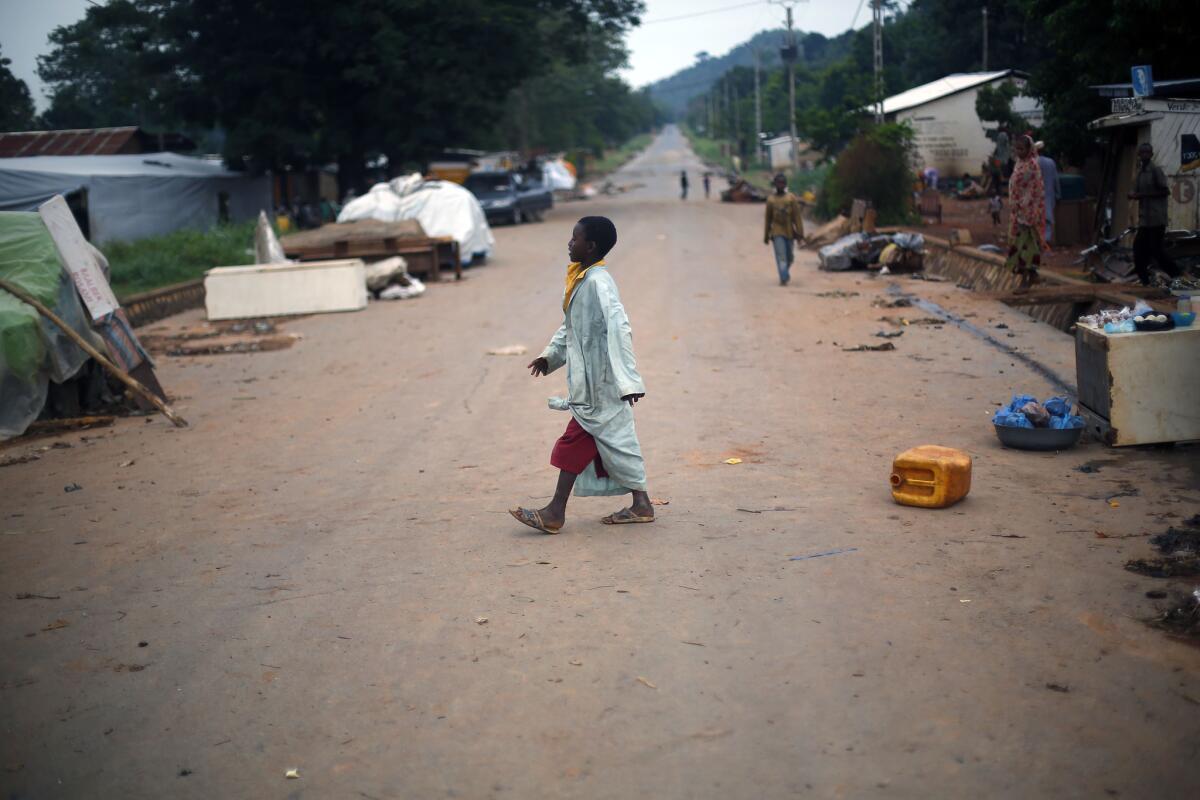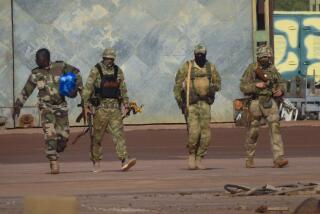U.N. peacekeepers authorized for Central African Republic

The United Nations Security Council on Thursday unanimously authorized a nearly 12,000-member peacekeeping force for the Central African Republic, where fighting between Christians and Muslims has been raging for months.
The U.N. force will take over Sept. 15 from nearly 6,000 African Union troops already deployed in the country, many of whom are expected to be incorporated into the new operation. A separate 2,000-member force sent by former colonial ruler France is authorized to support the U.N. mission.
The mineral-rich but deeply impoverished country plunged into anarchy when the Muslim-dominated Seleka rebel coalition seized power in March 2013.
Flight from rage: Conflict in the Central African Republic
Rebel leader Michel Djotodia was accused by human rights groups of failing to rein in abuses by his followers, who raped, looted and killed. After his government collapsed in January, local self-defense groups made up mostly of Christians and animists turned their fury on Muslim civilians, whom they accused of supporting the rebels.
People have been hacked to death by machete-wielding mobs. Homes, businesses and places of worship have been ransacked and set on fire. The scale of the violence has led to an exodus of Muslims from western parts of the country, which U.N. officials have described as “ethnic-religious cleansing.”
During a visit to the Central African Republic on Saturday, U.N. Secretary-General Ban Ki-moon said the French and African troops in the country were “overwhelmed.” He urged world leaders to heed the lessons of the 1994 Rwandan genocide, when more than 800,000 people died after majority Hutus went against minority Tutsis.
“The international community failed the people of Rwanda 20 years ago. And we are at risk of not doing enough for the people of the CAR today,” Ban said.
The resolution submitted by France and approved by the Security Council’s 15 members Thursday authorizes U.N. peacekeepers to protect civilians, facilitate the delivery of humanitarian aid, support the disarmament of combatants and help the transitional government extend state authority and prepare for elections.
It also authorizes the U.N. force to investigate abuses and help bring to justice those accused of war crimes and crimes against humanity.
International human rights groups had complained for months that the international response to the crisis was not sufficient to stem the violence in a country about the size of Texas.
Philippe Bolopion, the United Nations director at Human Rights Watch, called the approval of a U.N. peacekeeping mission “great news, but not an immediate game changer.”
In comments posted on Twitter, he urged the United Nations to carefully vet the troops it takes from the African Union force, some of whom have been accused of contributing to the violence.
Last week, Chad announced that it would withdraw its 850 peacekeeping troops from the Central African Republic following accusations that Chadian soldiers killed about 30 people and injured more than 300 others at a heavily Christian market in the capital, Bangui, last month.
U.N. investigators have said that the troops involved were members of Chad’s national army, who were sent to extract its nationals because they have been subject to attacks, and not members of the African Union force.
The bloodshed continues with fighting between rival militias in the central town of Dekoa reported to have killed as many as 30 people this week.
The clashes began Tuesday when Christian militiamen attacked the town, where fighters from the now disbanded Seleka had a tenuous hold, a local priest told the Associated Press. Most of the dead were civilians, killed when the ex-Seleka fired into a crowd of people they mistook for Christian militiamen, according to the priest, Everaldo de Suza.
Twitter: @alexzavis
More to Read
Start your day right
Sign up for Essential California for news, features and recommendations from the L.A. Times and beyond in your inbox six days a week.
You may occasionally receive promotional content from the Los Angeles Times.






